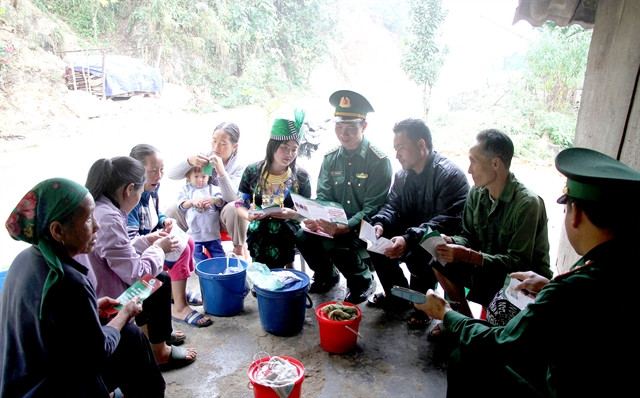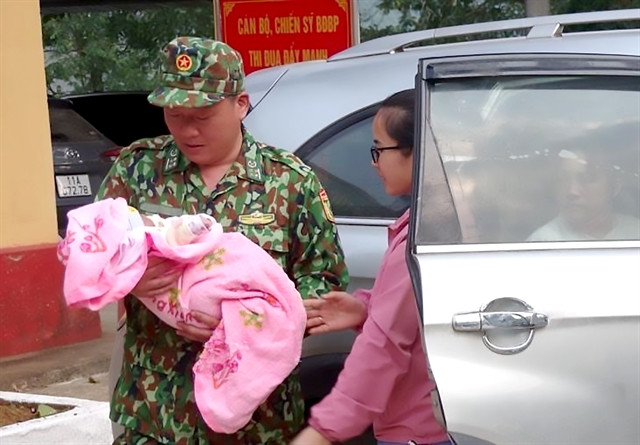 |
| Border soldiers in Nghệ An Province teach local ethnic minority people about preventing human trafficking. VNA/VNS Photo |
Following an appealing offer of an easy job with high income from a strange woman, Giàng Văn Thành (not his real name), born in 1981 in Bạc Liêu Province, went to work abroad in Myanmar in mid-July.
The woman promised to cover all immigration costs and offer him a monthly salary of VNĐ30 million.
After illegally entering Myanmar, Thành was kept in a high-rise building with dozens of other Vietnamese workers and forced to perform illegal work.
As he did not agree to work, he was locked up, brutally beaten, and then left to starve for many days.
Fortunately, he was able to run away, then contacted his family and Bạc Liêu Province’s police.
He was rescued and came back to Việt Nam in early September.
Nguyễn Thị Ngọc (not her real name), born in 1998 from northern Ninh Bình Province, is another victim of human trafficking who was able to escape but has suffered from serious physical and mental illness.
She made friends and fell in love with a man on Facebook in 2012 then met him in the northern mountainous province of Lào Cai where she was sold as a prostitute.
Refusing to accept the job, she ran away but was captured and beaten. When rescued and returned to Việt Nam, she suffered from severe psychological, mental and physical damage and had to undergo lengthy psychological treatment.
Thành and Ngọc are just two among thousands of human trafficking victims in Việt Nam.
Their tragedies and tear-soaked journeys back to their homeland have raised alarm over the complicated and serious problem of human trafficking.
Forced labour and prostitution
 |
| Border soldiers in Cao Bằng Province rescue a 15-day-old infant trafficked through the border with China in early 2023. VNA/VNS Photo |
Along the Việt Nam - Cambodia and Việt Nam – Laos borders, human trafficking activities have been reported at casinos and online business companies owned by foreigners involving forced labour, online fraud and sexual exploitation.
Among thousands of Vietnamese people working at casinos in Cambodia, many have been deceived to illegally cross the border and forced to work.
If they want to return home, they have to pay VNĐ100 - 150 million.
In Laos, human trafficking from many countries, including Việt Nam, tends to be on the rise in the Golden Triangle Special Economic Zone.
On the sea route, especially in the southern provinces, human trafficking activities for the purpose of forced labour at sea are also increasing, including women and teenage girls trafficking for the purpose of sexual exploitation.
According to the Government's Steering Committee for Crime Prevention and Control, the number of human trafficking victims increased from 222 in 2022 to 254 as of August this year.
Looking at cases that have been cracked by the Ministry of Public Security and other competent agencies, from 2012 to 2020, most were trans-national, accounting for over 85 per cent of cases.
Domestic human trafficking is now increasing with more cases reported within the country.
In 2022 alone, the number of domestic human trafficking cases accounted for over 45 per cent of the total.
Park Mihyung, chief of mission of the International Organisation for Migration (IOM), said in the past, we used to think that human trafficking only involved moving, travelling or transporting a person across state or national borders. However, human trafficking could occur within the borders of any country, including Việt Nam.
“Victims of human trafficking can be recruited and trafficked in their hometowns, even within their own homes,” she told Vietnam News Agency.
According to the Ministry of Public Security, from 2018 to 2022, there were 1,240 human trafficking victims. However, according to the National Assembly’s Judicial Affairs Committee, the number of human traffickers discovered remains low compared to the actual number.
The number of human trafficking cases prosecuted is even lower than in the previous periods, according to Mai Thị Phương Hoa, vice chairwoman of the committee.
During the 2012-20 period, an average of 162 cases were prosecuted per year. From 2018 to 2022, an average 77.2 cases were prosecuted every year. Human trafficking cases were discovered mainly through denunciations from victims or victims' families, according to the committee.
Hoa said: “There are many cases with the involvement of big groups trafficking a large number of victims over a long time. Many of the victims are under 16 years old but have not been detected.”
Both the NA’s Judicial Committee and the Ministry of Public Security agreed that it was necessary to make amendments to the Law on Trafficking in Persons Prevention and Combat which took effect in 2012 due to some out-of-date articles and the sophistication of human trafficking tricks.
Park Mihyung from the IOM said that after 10 years of implementing the Law on Trafficking in Persons Prevention and Combat (or TIP Law), it is the right time to review and amend the law. This is an essential step to ensure Việt Nam is equipped to respond to emerging trends and risks of trafficking in persons, which affect everyone, including men, women, elders, boys and girls.
Effectively addressing human trafficking requires up-to-date and reliable data to empirically ground policy, programmes, and support for the victims. Therefore, the law revision should look at institutionalising the establishment of a centralised trafficking database that also includes victims’ data and their support needs, she said.
Home for victims
Many reintegration shelters have been established at human trafficking hot spots across the country to offer assistance to human trafficking victims.
The reintegration shelter in the northern mountainous province of Lào Cai is home to rescued human trafficking victims. It was built with the assistance of PacificLinks Foundation and the UK Embassy in Việt Nam.
Phạm Khanh (not her real name) was sold to a Chinese family at the age of 12 and was assisted by a local to be able to ask local authorities for help.
On the first days at the reintegration shelter, the girl could not speak much. After psychological counselling sessions, she began to open up to share the process of being tricked and sold and running away through drawings.
Thanks to the project “Supporting victims of trafficking to return and reintegrate into the community", after two years, she passed the entrance exam to a vocational school and now has become a tour guide.
Khanh is one of 275 victims of human trafficking who stayed at the reintegration shelter in Lào Cai Province over the past 13 years.
The victims have been provided with safe accommodation and essential support services, health care, consultation, life skills, and vocational training to help them reintegrate into the community.
During the COVID-19 pandemic from 2021 to mid-2023, the shelter received 66 new cases, including 20 victims of trafficking and 46 others suspected of being victims of trafficking.
Peace House and Blue Dragon Children's shelter in Hà Nội are other examples of active reintegration shelters for human trafficking victims. The two shelters rescued and supported 26 victims to return. After getting support from social organisations, the victims receive initial essential needs and are handed over to their locality and family.
Đàm Thị Minh Thu, head of the Department for Social Vices Prevention under the Ministry of Labour, Invalids and Social Affairs, said many localities have established a network of coordinators to receive human trafficking victims and help them reintegrate into the community.
“All sectors and localities have put the victims at the centre in every human trafficking prevention and combat solution,” she said. — VNS